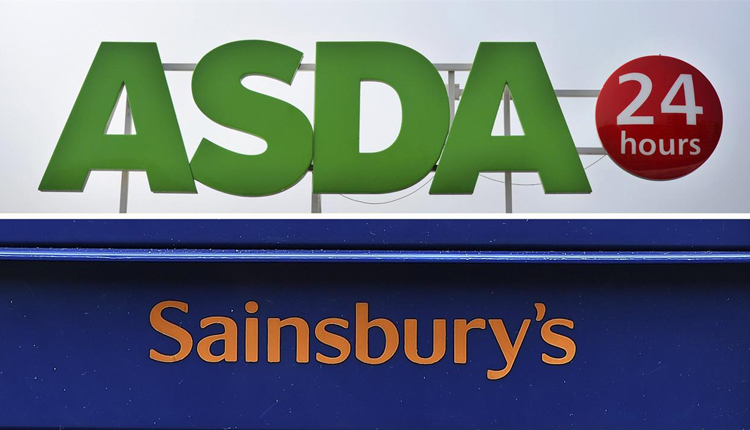Britain’s Sainsbury’s and Asda agree £7.3bn merger
Sainsbury's shares surge 20% at early trade
Sainsbury’s (SBRY.L) has agreed to buy Walmart’s (WMT.N) Asda for about £7.3 billion ($10 billion) to create Britain’s biggest supermarket group by market share, overtaking long-standing industry leader Tesco (TSCO.L).
The deal – likely to face close scrutiny by competition authorities – will create a grocery powerhouse overtaking Tesco as the number one player in the sector, with combined revenues of £51 billion.
There are no plans to close Sainsbury’s or Asda stores though executives are targeting savings of £500 million, including “operational efficiencies” and by opening Argos concessions in Asda stores.
Sainsbury’s also said customers would see benefits including price cuts of 10 percent on many of the products that customers buy regularly.
Asda’s US owner Walmart would receive just under £3 billion in cash plus a 42 percent stake in the combined business, in a deal which values the Leeds-based chain at £7.3 billion. Sainsbury’s market value, before trading opened on Monday, was £5.9 billion.
Details of the agreement were set out in a stock market announcement two days after Sky News first revealed that the two supermarkets with the second and third biggest share of the sector were in advanced talks over a merger.
Shares in Sainsbury’s leapt by as much as 20 percent in early trading, while rivals Tesco and Morrisons were about 3 percent lower on opening.
Sainsbury’s – which also owns Argos – said the merger would create a network of more than 2,800 Sainsbury’s, Asda and Argos locations. It will have more than 330,000 employees.
Unions have voiced fears that the merger would threaten tens of thousands of jobs.
Finance director Kevin O’Byrne told Sky News no job losses were planned.
Combining Sainsbury’s and Asda will create a supermarket business with a 31 percent share of the grocery sector, leapfrogging current leader Tesco, on 28 percent. The deal is expected to complete in the second half of 2019.
It comes at a time when the major players are battling to remain competitive, with households facing an income squeeze and German-owned discounters Aldi and Lidl posing a growing threat.
The announcement also revealed that Asda’s operating profit for 2017 had fallen by 15 percent to £720 million, despite a recovery in sales, as it piled investment into keeping prices down.
Meanwhile, Sainsbury’s reported a 19 percent fall in its annual profit for the 52 weeks to 10 March to £409 million as it counted the cost of a stores shake-up.
Plans for the merger will see the newly-enlarged business led by Sainsbury’s chief executive Mike Coupe with Asda continuing to be run from Leeds with its own chief executive – who will join the board.
Coupe said: “This is a transformational opportunity to create a new force in UK retail, which will be more competitive and give customers more of what they want now and in the future.
“It will create a business that is more dynamic, more adaptable, more resilient and an even bigger contributor to the UK economy.”
Asda chief executive Roger Burnley said: “The combination of Asda and Sainsbury’s into a single retailing group will be great news for Asda customers, allowing us to deliver even lower prices in store and even greater choice.
“Asda will continue to be Asda, but by coming together with Sainsbury’s supported by Walmart, we can further accelerate our existing strategy and make our offer even more compelling and competitive.”
Laith Khalaf, senior analyst at Hargreaves Lansdown, said: “There are clear benefits from the two supermarkets joining forces, particularly when it comes to leveraging their combined buying power, which should result in both lower prices for customers and higher margins for the business.
Simran Jagdev, companies analyst at the Economist Intelligence Unit, told The Guardian that the Sainsbury’s decision to tie-up with Asda is a surprise, partly prompted by the threat of Amazon:
The deal points to the highly competitive UK grocery market, which has long been concentrated in the hands of the top four players— Tesco, Sainsbury, Asda, Morrisons – but is now facing an onslaught from new challengers. Sainsbury’s seems to be continuing the offensive against online players such as Amazon and discount grocery retailers such as Aldi and Lidl that Tesco started last year with its merger with Booker.
The deal will help Sainsbury fend off this new competition. It will also mark Walmart’s operational exit from the UK, as part of its strategic decisions to instead work through partnerships in international markets.
Amisha Chohan, equity research analyst at Quilter Cheviot, also told The Guardian the deal is a “masterstroke” – as long as the CMA approve it.
It would result in the company becoming the biggest grocer in the UK, ahead of Tesco. Its guided net synergies of over £500 million seem prudent and we believe it could be significantly in excess of this. Sainsbury’s experience from the Argos acquisition should enable it to deliver ahead of the synergy guidance.
Although this news is not ideal for Tesco, we remain positive on the UK’s current largest retailer due its recent takeover of Booker, and the wholesale opportunities this will bring.”
Source: Reuters, Sky News, and The Guardian


